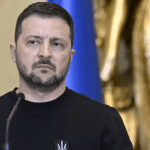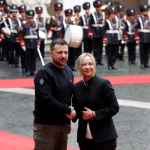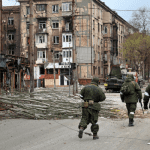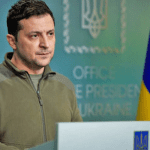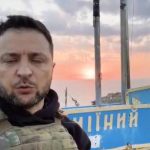President of Ukraine, Volodymyr Zelenskyy spoke to British government ministers on Friday, a rare attendance by a foreign leader at a cabinet meeting that new Prime Minister, Keir Starmer believes will emphasise London’s support for Kyiv.
A day after hosting a roundtable of European leaders at Blenheim Palace, Starmer continued his efforts to strengthen Britain’s involvement in international affairs by asking Zelenskyy to address his cabinet of ministers.
Starmer’s office stated that the previous foreign leader to do so was US President Bill Clinton in 1997.
Zelenskyy was welcomed to the meeting with a standing ovation and clapping from British officials.
He reiterated his request for Western allies to approve long-range strikes on Russia, saying Britain should strive to persuade its partners to remove the restrictions on their use.
Starmer, who met Zelenskyy separately for 35 minutes before a wider bilateral with officials, told Zelenskyy that Britain would speed up delivery of aid to Ukraine.
NATO members have taken different approaches to how Ukraine can use weapons they donate.
Some have made clear Kyiv can use them to strike targets inside Russia while the United States has taken a narrower approach, allowing its weapons to be used only just inside Russia’s border against targets supporting Russian military operations in Ukraine.
Britain has been a vocal supporter of Ukraine since Russia’s full-scale invasion in 2022 and Starmer swiftly reaffirmed London’s commitment to Kyiv after winning a landslide election earlier this month, telling Zelenskyy at NATO that despite the change of government, there would be “no change of approach”.
Starmer said on Thursday that Britain would pursue a new plan to try to disrupt Russia’s attempts to evade shipping sanctions.
Britain also announced sanctions on 11 vessels used to transport Russian oil.
The UK PM also unveiled the Defence Export Support Treaty, to be signed by defence ministers, that will enable Ukraine to draw on 3.5 billion pounds ($4.5 billion) of export finance, to bolster both countries’ defence industrial bases and boost production.
President of Ukraine, Volodymyr Zelenskyy spoke to British government ministers on Friday, a rare attendance by a foreign leader at a cabinet meeting that new Prime Minister, Keir Starmer believes will emphasise London’s support for Kyiv.
A day after hosting a roundtable of European leaders at Blenheim Palace, Starmer continued his efforts to strengthen Britain’s involvement in international affairs by asking Zelenskyy to address his cabinet of ministers.
Starmer’s office stated that the previous foreign leader to do so was US President Bill Clinton in 1997.
Zelenskyy was welcomed to the meeting with a standing ovation and clapping from British officials.
He reiterated his request for Western allies to approve long-range strikes on Russia, saying Britain should strive to persuade its partners to remove the restrictions on their use.
Starmer, who met Zelenskyy separately for 35 minutes before a wider bilateral with officials, told Zelenskyy that Britain would speed up delivery of aid to Ukraine.
NATO members have taken different approaches to how Ukraine can use weapons they donate.
Some have made clear Kyiv can use them to strike targets inside Russia while the United States has taken a narrower approach, allowing its weapons to be used only just inside Russia’s border against targets supporting Russian military operations in Ukraine.
Britain has been a vocal supporter of Ukraine since Russia’s full-scale invasion in 2022 and Starmer swiftly reaffirmed London’s commitment to Kyiv after winning a landslide election earlier this month, telling Zelenskyy at NATO that despite the change of government, there would be “no change of approach”.
Starmer said on Thursday that Britain would pursue a new plan to try to disrupt Russia’s attempts to evade shipping sanctions.
Britain also announced sanctions on 11 vessels used to transport Russian oil.
The UK PM also unveiled the Defence Export Support Treaty, to be signed by defence ministers, that will enable Ukraine to draw on 3.5 billion pounds ($4.5 billion) of export finance, to bolster both countries’ defence industrial bases and boost production.
President of Ukraine, Volodymyr Zelenskyy spoke to British government ministers on Friday, a rare attendance by a foreign leader at a cabinet meeting that new Prime Minister, Keir Starmer believes will emphasise London’s support for Kyiv.
A day after hosting a roundtable of European leaders at Blenheim Palace, Starmer continued his efforts to strengthen Britain’s involvement in international affairs by asking Zelenskyy to address his cabinet of ministers.
Starmer’s office stated that the previous foreign leader to do so was US President Bill Clinton in 1997.
Zelenskyy was welcomed to the meeting with a standing ovation and clapping from British officials.
He reiterated his request for Western allies to approve long-range strikes on Russia, saying Britain should strive to persuade its partners to remove the restrictions on their use.
Starmer, who met Zelenskyy separately for 35 minutes before a wider bilateral with officials, told Zelenskyy that Britain would speed up delivery of aid to Ukraine.
NATO members have taken different approaches to how Ukraine can use weapons they donate.
Some have made clear Kyiv can use them to strike targets inside Russia while the United States has taken a narrower approach, allowing its weapons to be used only just inside Russia’s border against targets supporting Russian military operations in Ukraine.
Britain has been a vocal supporter of Ukraine since Russia’s full-scale invasion in 2022 and Starmer swiftly reaffirmed London’s commitment to Kyiv after winning a landslide election earlier this month, telling Zelenskyy at NATO that despite the change of government, there would be “no change of approach”.
Starmer said on Thursday that Britain would pursue a new plan to try to disrupt Russia’s attempts to evade shipping sanctions.
Britain also announced sanctions on 11 vessels used to transport Russian oil.
The UK PM also unveiled the Defence Export Support Treaty, to be signed by defence ministers, that will enable Ukraine to draw on 3.5 billion pounds ($4.5 billion) of export finance, to bolster both countries’ defence industrial bases and boost production.
President of Ukraine, Volodymyr Zelenskyy spoke to British government ministers on Friday, a rare attendance by a foreign leader at a cabinet meeting that new Prime Minister, Keir Starmer believes will emphasise London’s support for Kyiv.
A day after hosting a roundtable of European leaders at Blenheim Palace, Starmer continued his efforts to strengthen Britain’s involvement in international affairs by asking Zelenskyy to address his cabinet of ministers.
Starmer’s office stated that the previous foreign leader to do so was US President Bill Clinton in 1997.
Zelenskyy was welcomed to the meeting with a standing ovation and clapping from British officials.
He reiterated his request for Western allies to approve long-range strikes on Russia, saying Britain should strive to persuade its partners to remove the restrictions on their use.
Starmer, who met Zelenskyy separately for 35 minutes before a wider bilateral with officials, told Zelenskyy that Britain would speed up delivery of aid to Ukraine.
NATO members have taken different approaches to how Ukraine can use weapons they donate.
Some have made clear Kyiv can use them to strike targets inside Russia while the United States has taken a narrower approach, allowing its weapons to be used only just inside Russia’s border against targets supporting Russian military operations in Ukraine.
Britain has been a vocal supporter of Ukraine since Russia’s full-scale invasion in 2022 and Starmer swiftly reaffirmed London’s commitment to Kyiv after winning a landslide election earlier this month, telling Zelenskyy at NATO that despite the change of government, there would be “no change of approach”.
Starmer said on Thursday that Britain would pursue a new plan to try to disrupt Russia’s attempts to evade shipping sanctions.
Britain also announced sanctions on 11 vessels used to transport Russian oil.
The UK PM also unveiled the Defence Export Support Treaty, to be signed by defence ministers, that will enable Ukraine to draw on 3.5 billion pounds ($4.5 billion) of export finance, to bolster both countries’ defence industrial bases and boost production.
President of Ukraine, Volodymyr Zelenskyy spoke to British government ministers on Friday, a rare attendance by a foreign leader at a cabinet meeting that new Prime Minister, Keir Starmer believes will emphasise London’s support for Kyiv.
A day after hosting a roundtable of European leaders at Blenheim Palace, Starmer continued his efforts to strengthen Britain’s involvement in international affairs by asking Zelenskyy to address his cabinet of ministers.
Starmer’s office stated that the previous foreign leader to do so was US President Bill Clinton in 1997.
Zelenskyy was welcomed to the meeting with a standing ovation and clapping from British officials.
He reiterated his request for Western allies to approve long-range strikes on Russia, saying Britain should strive to persuade its partners to remove the restrictions on their use.
Starmer, who met Zelenskyy separately for 35 minutes before a wider bilateral with officials, told Zelenskyy that Britain would speed up delivery of aid to Ukraine.
NATO members have taken different approaches to how Ukraine can use weapons they donate.
Some have made clear Kyiv can use them to strike targets inside Russia while the United States has taken a narrower approach, allowing its weapons to be used only just inside Russia’s border against targets supporting Russian military operations in Ukraine.
Britain has been a vocal supporter of Ukraine since Russia’s full-scale invasion in 2022 and Starmer swiftly reaffirmed London’s commitment to Kyiv after winning a landslide election earlier this month, telling Zelenskyy at NATO that despite the change of government, there would be “no change of approach”.
Starmer said on Thursday that Britain would pursue a new plan to try to disrupt Russia’s attempts to evade shipping sanctions.
Britain also announced sanctions on 11 vessels used to transport Russian oil.
The UK PM also unveiled the Defence Export Support Treaty, to be signed by defence ministers, that will enable Ukraine to draw on 3.5 billion pounds ($4.5 billion) of export finance, to bolster both countries’ defence industrial bases and boost production.
President of Ukraine, Volodymyr Zelenskyy spoke to British government ministers on Friday, a rare attendance by a foreign leader at a cabinet meeting that new Prime Minister, Keir Starmer believes will emphasise London’s support for Kyiv.
A day after hosting a roundtable of European leaders at Blenheim Palace, Starmer continued his efforts to strengthen Britain’s involvement in international affairs by asking Zelenskyy to address his cabinet of ministers.
Starmer’s office stated that the previous foreign leader to do so was US President Bill Clinton in 1997.
Zelenskyy was welcomed to the meeting with a standing ovation and clapping from British officials.
He reiterated his request for Western allies to approve long-range strikes on Russia, saying Britain should strive to persuade its partners to remove the restrictions on their use.
Starmer, who met Zelenskyy separately for 35 minutes before a wider bilateral with officials, told Zelenskyy that Britain would speed up delivery of aid to Ukraine.
NATO members have taken different approaches to how Ukraine can use weapons they donate.
Some have made clear Kyiv can use them to strike targets inside Russia while the United States has taken a narrower approach, allowing its weapons to be used only just inside Russia’s border against targets supporting Russian military operations in Ukraine.
Britain has been a vocal supporter of Ukraine since Russia’s full-scale invasion in 2022 and Starmer swiftly reaffirmed London’s commitment to Kyiv after winning a landslide election earlier this month, telling Zelenskyy at NATO that despite the change of government, there would be “no change of approach”.
Starmer said on Thursday that Britain would pursue a new plan to try to disrupt Russia’s attempts to evade shipping sanctions.
Britain also announced sanctions on 11 vessels used to transport Russian oil.
The UK PM also unveiled the Defence Export Support Treaty, to be signed by defence ministers, that will enable Ukraine to draw on 3.5 billion pounds ($4.5 billion) of export finance, to bolster both countries’ defence industrial bases and boost production.
President of Ukraine, Volodymyr Zelenskyy spoke to British government ministers on Friday, a rare attendance by a foreign leader at a cabinet meeting that new Prime Minister, Keir Starmer believes will emphasise London’s support for Kyiv.
A day after hosting a roundtable of European leaders at Blenheim Palace, Starmer continued his efforts to strengthen Britain’s involvement in international affairs by asking Zelenskyy to address his cabinet of ministers.
Starmer’s office stated that the previous foreign leader to do so was US President Bill Clinton in 1997.
Zelenskyy was welcomed to the meeting with a standing ovation and clapping from British officials.
He reiterated his request for Western allies to approve long-range strikes on Russia, saying Britain should strive to persuade its partners to remove the restrictions on their use.
Starmer, who met Zelenskyy separately for 35 minutes before a wider bilateral with officials, told Zelenskyy that Britain would speed up delivery of aid to Ukraine.
NATO members have taken different approaches to how Ukraine can use weapons they donate.
Some have made clear Kyiv can use them to strike targets inside Russia while the United States has taken a narrower approach, allowing its weapons to be used only just inside Russia’s border against targets supporting Russian military operations in Ukraine.
Britain has been a vocal supporter of Ukraine since Russia’s full-scale invasion in 2022 and Starmer swiftly reaffirmed London’s commitment to Kyiv after winning a landslide election earlier this month, telling Zelenskyy at NATO that despite the change of government, there would be “no change of approach”.
Starmer said on Thursday that Britain would pursue a new plan to try to disrupt Russia’s attempts to evade shipping sanctions.
Britain also announced sanctions on 11 vessels used to transport Russian oil.
The UK PM also unveiled the Defence Export Support Treaty, to be signed by defence ministers, that will enable Ukraine to draw on 3.5 billion pounds ($4.5 billion) of export finance, to bolster both countries’ defence industrial bases and boost production.
President of Ukraine, Volodymyr Zelenskyy spoke to British government ministers on Friday, a rare attendance by a foreign leader at a cabinet meeting that new Prime Minister, Keir Starmer believes will emphasise London’s support for Kyiv.
A day after hosting a roundtable of European leaders at Blenheim Palace, Starmer continued his efforts to strengthen Britain’s involvement in international affairs by asking Zelenskyy to address his cabinet of ministers.
Starmer’s office stated that the previous foreign leader to do so was US President Bill Clinton in 1997.
Zelenskyy was welcomed to the meeting with a standing ovation and clapping from British officials.
He reiterated his request for Western allies to approve long-range strikes on Russia, saying Britain should strive to persuade its partners to remove the restrictions on their use.
Starmer, who met Zelenskyy separately for 35 minutes before a wider bilateral with officials, told Zelenskyy that Britain would speed up delivery of aid to Ukraine.
NATO members have taken different approaches to how Ukraine can use weapons they donate.
Some have made clear Kyiv can use them to strike targets inside Russia while the United States has taken a narrower approach, allowing its weapons to be used only just inside Russia’s border against targets supporting Russian military operations in Ukraine.
Britain has been a vocal supporter of Ukraine since Russia’s full-scale invasion in 2022 and Starmer swiftly reaffirmed London’s commitment to Kyiv after winning a landslide election earlier this month, telling Zelenskyy at NATO that despite the change of government, there would be “no change of approach”.
Starmer said on Thursday that Britain would pursue a new plan to try to disrupt Russia’s attempts to evade shipping sanctions.
Britain also announced sanctions on 11 vessels used to transport Russian oil.
The UK PM also unveiled the Defence Export Support Treaty, to be signed by defence ministers, that will enable Ukraine to draw on 3.5 billion pounds ($4.5 billion) of export finance, to bolster both countries’ defence industrial bases and boost production.




